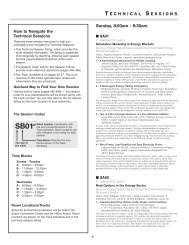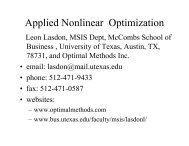Sunday
Sunday
Sunday
Create successful ePaper yourself
Turn your PDF publications into a flip-book with our unique Google optimized e-Paper software.
SA43<br />
3 - Freight Origin-destination Estimation using Bayesian Networks<br />
Based on Multiple Data Sources<br />
Yinyi Ma, Erasmus University Rotterdam, Burg. Oudlaan 50,<br />
Rotterdam, Netherlands, yma@rsm.nl, Roelof Kuik,<br />
Henk van Zuylen<br />
Freight origin-destination (OD) estimation becomes increasingly important.<br />
Traditional general traffic OD estimation methods based on loop detectors have<br />
the under-specification problem. This paper investigates a Bayesian Networks<br />
approach for estimating freight OD-matrices by Markov-chain-Monte-Carlo<br />
methods, thereby mitigating under-determinacy by exploiting proportionallycontributing<br />
multiple data sources, such as camera, Bluetooth and<br />
Weigh-in-Motion.<br />
4 - Simulation and Multi-objective Optimization Combining<br />
Framework for Container Terminal Optimization<br />
Zhougeng Lin, PhD Student, University of Portsmouth, Lion Gate<br />
Building, Lion Terrace, Portsmouth, PO1 3HF, United Kingdom,<br />
Zhougeng.Lin@Port.Ac,Uk, Dylan Jones<br />
This presentation proposes a combining framework to integrate simulation and<br />
multi-objective optimization(MOO) for better description of dynamic real-world<br />
systems in low cost and reasonable computational time. A case study on container<br />
terminal equipment optimization is discussed to demonstrate its applications.<br />
Results are compared by post-MOO structure and integrated MOO structure.<br />
■ SA43<br />
43- North 228 A- CC<br />
RAS Student Paper Award<br />
Sponsor: Railway Applications<br />
Sponsored Session<br />
Chair: Juan Morales, BNSF Railway, TX, United States of America,<br />
Juan.Morales@BNSF.com<br />
1 - RAS Student Paper Award<br />
Juan Morales, BNSF Railway, TX, United States of America,<br />
Juan.Morales@BNSF.com<br />
Finalists of the 2012 RAS Student Paper Award will present their work in this<br />
session. Finalists were not determined prior to the abstract submission deadline of<br />
the printed programs.<br />
■ SA44<br />
44- North 228 B- CC<br />
Supply Chain Structures and Incentives<br />
Contributed Session<br />
Chair: Suleyman Demirel, PhD Candidate, University of Michigan,<br />
701 Tappan St., Ann Arbor, MI, 48109, United States of America,<br />
sdemirel@umich.edu<br />
1 - Agile Supply Chain Building via Semantic Supplier Search<br />
Jaehun Lee, POSTECH, 312, Eng4, POSTECH, Hyoja, Pohang,<br />
Korea, Republic of, jaehun_lee@postech.ac.kr, Taejong Yoo,<br />
Hyunbo Cho, Bohyun Kim<br />
The goal of a supply chain in manufacturing domain is to guarantee that the right<br />
amount of the right product is in the right place at the right time. To accomplish<br />
this, an agile supply chain formation is critical. We propose a semantic<br />
manufacturing supplier discovery framework that structuralizes buyer’s demand<br />
requirements and supplier’s capability information to assist in building such a<br />
supply chain.<br />
2 - Supply Network Structure and Firm Innovation:<br />
An Empirical Investigation<br />
Marcus Bellamy, Georgia Institute of Technology, 800 West<br />
Peachtree ST NW, Atlanta, GA, 30308, United States of America,<br />
marcus.bellamy@gatech.edu, Soumen Ghosh, Manpreet Hora<br />
We investigate the impact of supply network structure on firm innovation. Using<br />
a network-analytic lens, we develop and test our hypotheses linking firm level<br />
network properties and innovation. Our analysis considers how firm innovation is<br />
affected through the extended network it shares between each entity in the<br />
supply network.<br />
INFORMS Phoenix – 2012<br />
70<br />
3 - The Effect of a Temporary Product Distribution Channel on<br />
Supply Chain Performance<br />
Moutaz Khouja, Professor, University of North Carolina-Charlotte,<br />
9201 University City Blvd., Charlotte, NC, 28223,<br />
United States of America, mjkhouja@uncc.edu<br />
We analyze a supply chain of a manufacturer and two retailers. The first retailer<br />
always stocks the product. The second retailer is a deal-of-the day (DOTD) retailer<br />
who sells the product for a short time of few days at a discount. The DOTD<br />
retailer sells the product at a discount due to a price discount she gets for ordering<br />
a large quantity. We identify the discounted wholesale price and the discount<br />
order quantity. We find that he temporary channel can increase the profit of the<br />
manufacturer.<br />
4 - Revisiting Interorganizational Trust: Is More Always Better or<br />
Could More Be Worse?<br />
Veronica H. Villena, Assistant Professor, Pennsylvania State<br />
University, 410 Business Building, University Park, State College,<br />
PA, 16802, United States of America, vhv1@psu.edu,<br />
Thomas Choi, Elena Revilla<br />
We conduct a more comprehensive examination of trust by considering both its<br />
positive and negative effects and by investigating how they function differently<br />
under different types of uncertainties.We use data from a sample of 133 buyersupplier<br />
relationships. The results suggest that the negative effects of trust become<br />
more notable when there is high behavioral uncertainty between buyers and<br />
suppliers and less evident when there is high environmental uncertainty for<br />
buyers.<br />
■ SA45<br />
45- North 229 A- CC<br />
JFIG Paper Competition I<br />
Sponsor: Junior Faculty Interest Group<br />
Sponsored Session<br />
Chair: Esra Buyuktahtakin, Assistant Professor, Wichita State<br />
University, IME Department, Wichita, KS, United States of America,<br />
esra.b@wichita.edu<br />
1 - JFIG Paper Competition<br />
Esra Buyuktahtakin, Assistant Professor, Wichita State University,<br />
IME Department, Wichita, KS, United States of America,<br />
esra.b@wichita.edu<br />
Papers are submitted for this year’s JFIG paper competition, and each one is<br />
evaluated based on the importance of the topic, appropriateness of the research<br />
approach, and the significance of research contribution. In this session, finalistsselected<br />
in two rounds of review, will present their papers. For the selected<br />
finalists and the abstracts of the selected papers, please refer to the online<br />
program.<br />
■ SA46<br />
46- North 229 B- CC<br />
Organizational and Industry Renewal (I): Innovation,<br />
Industry Context, and Population-Level Learning<br />
Sponsor: Organization Science<br />
Sponsored Session<br />
Chair: Andreas Schwab, , Associate Professor, Iowa State University,<br />
3315 Gerdin, Ames, IA, 50011, United States of America,<br />
aschwab@iastate.edu<br />
1 - Exploring Organizational Identity and Organizational Design in<br />
Technological Transitions<br />
Mary Tripsas, Associate Professor, Harvard Business School,<br />
219 Rock Center, Soldiers Field Rd, Boston, MA, 02163,<br />
United States of America, mtripsas@hbs.edu<br />
Innovation research suggests that a separate new technology unit with its own<br />
identity increases the odds of a successful technological transformation. Identity<br />
research, however, has shown that multiple identities can be harmful, posing a<br />
dilemma. Through a comparison of FujiFilm and Polaroid’s reactions to digital<br />
imaging, we propose that establishing a separate new technology unit can cause<br />
dormant identity conflicts to surface, and reconciling those conflicts is critical to<br />
success.



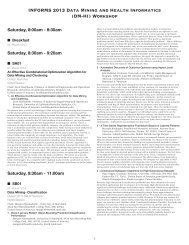
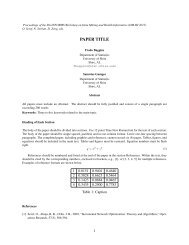
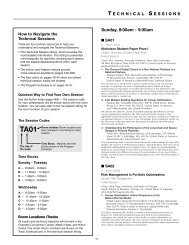
![[PDF] Charlotte Back Matter](https://img.yumpu.com/17933057/1/190x245/pdf-charlotte-back-matter.jpg?quality=85)
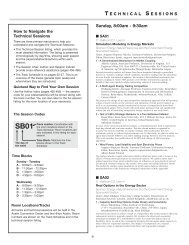
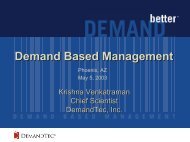
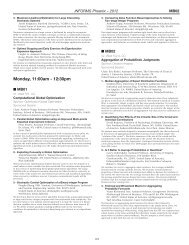
![[PDF] ALIO Back Matter](https://img.yumpu.com/17932960/1/190x245/pdf-alio-back-matter.jpg?quality=85)
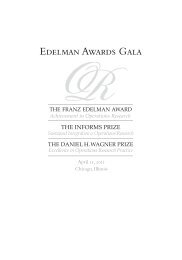
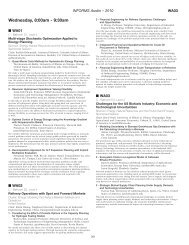
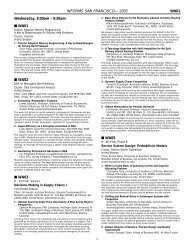
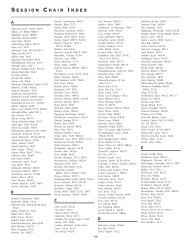
![[PDF] Monday, 8:00am - 9:30am](https://img.yumpu.com/17932954/1/190x245/pdf-monday-800am-930am.jpg?quality=85)
